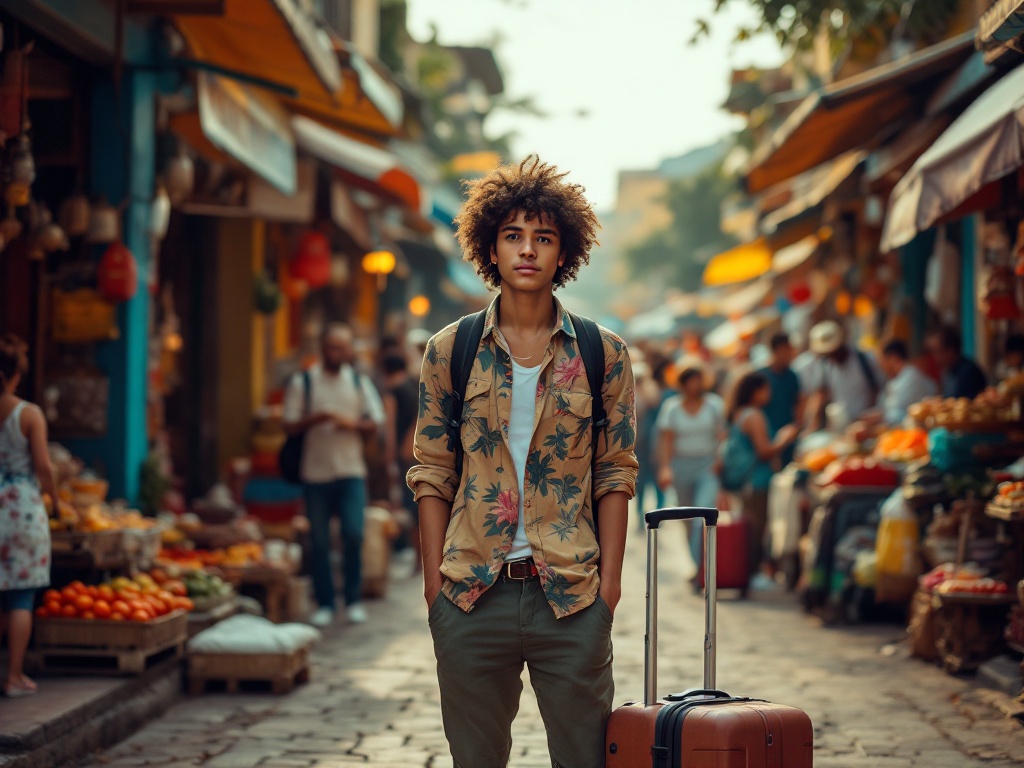Mental Health During Travel: How to Deal with Culture Schock
Are you planning an international trip? Stepping into a new culture can be exciting, but it can also lead to culture shock, impacting your mental well-being. Learn about the common symptoms, from anxiety and homesickness to jet lag and social isolation, and discover effective coping mechanisms. This article provides practical strategies for navigating cultural differences, managing emotional distress, building a support system, and even handling reverse culture shock upon your return. Prepare yourself for a smoother, more enjoyable travel experience by understanding and addressing the mental health aspects of cultural immersion. Read on to unlock the secrets to thriving in a new environment.
Important information

- Culture shock is a common experience when immersed in a new culture, often causing anxiety, frustration, and homesickness. It’s a normal adjustment process.
- Symptoms like sadness, anxiety, irritability, sleep problems, and difficulty concentrating can occur. Connecting with others, self-care, and mindfulness can help.
- Language barriers, unfamiliar surroundings, jet lag, and social isolation contribute to culture shock. Learning about the host country and connecting with expats or locals can ease the transition.
- Professional help is available if needed. Tele-health services offer support and therapy, sometimes covered by insurance.
- Reverse culture shock can happen upon returning home. Staying connected with loved ones, reflecting on experiences, and embracing change are crucial for reintegration.
Understanding Culture Shock and Its Impact on Mental Health During Travel
Moving to a new culture can be disorienting and lead to culture shock. Unfamiliar customs and traditions can leave you feeling anxious, frustrated, and even homesick. This is a normal part of adjusting to life in a new country, especially during international travel. These challenges can impact your mental well-being, but they typically subside as you become more accustomed to your surroundings.
What is Culture Shock?
Moving to a new culture can be a disorienting experience, often leaving individuals feeling lost, confused, and anxious. Feelings of homesickness and loneliness are common and can sometimes lead to depression and lethargy. This is a normal part of the adjustment process, and many newcomers share these experiences.
Common Symptoms of Culture Shock
Culture shock can trigger a range of challenging emotions, from anxiety and depression to irritability and difficulty concentrating. Intense homesickness is also common, often accompanied by disrupted sleep, fatigue, and headaches. Recognizing these symptoms is crucial for maintaining your mental well-being while abroad. Feelings of sadness, loneliness, anger, and frustration can also emerge. If you experience these symptoms, consider these strategies:
- Connect with other expats or locals, joining groups with shared interests.
- Maintain a healthy lifestyle through regular exercise, balanced nutrition, and sufficient sleep.
- Engage in mindfulness practices like meditation or deep breathing to manage stress.
- Limit contact with home if it intensifies homesickness, focusing on adapting to your new environment.
- Seek professional support if your symptoms persist or become overwhelming.
Emotional Reactions and Mental Well-being
Navigating a new culture can be challenging, often leading to feelings of confusion, frustration, and isolation. These emotions can significantly affect your mental well-being, so prioritizing your mental health while traveling is essential. Steer clear of excessive alcohol, nicotine, or drugs, as these substances can exacerbate stress. Fortunately, there are ways to cope with culture shock and maintain your mental well-being while traveling:
Connect with Others
Connecting with others can provide valuable support during your travels. Reach out to family and friends back home through calls or video chats. Consider joining group activities or tours to meet fellow travelers and share experiences. Engaging with locals can also enrich your trip and provide a sense of belonging.
Practice Self-Care
Prioritizing self-care is crucial for managing the emotional rollercoaster of culture shock. Incorporate mindfulness exercises, meditation, or deep breathing techniques into your daily routine. Ensure you get enough sleep and maintain a balanced diet. Engage in activities you enjoy, whether it’s reading, listening to music, or exploring nature.
By taking care of yourself, you can better enjoy your travel experiences.
Factors Contributing to Culture Shock
Experiencing culture shock when immersing yourself in a new environment is common. Unfamiliar customs and social expectations can be overwhelming, especially with a language barrier. This can lead to feelings of isolation and frustration. Navigating a new environment adds another layer of complexity, intensifying the disorientation. Jet lag can disrupt sleep, impacting emotional well-being and making individuals more susceptible to culture shock. These factors combined create a challenging adjustment period.
Unfamiliar Surroundings and Cultural Norms
Experiencing a new culture can be disorienting. Unfamiliar customs and languages, compounded by a different environment, can feel overwhelming. It’s perfectly normal to feel some discomfort as you adjust. Recognizing this is key to managing culture shock, and remember, you’re not alone in this.
The Role of Language Barrier
Navigating a new culture can be isolating, especially when language differences intensify the shock. Everyday tasks become hurdles, and misunderstandings arise, creating frustration. Struggling to communicate, both expressing yourself and understanding others, heightens anxiety and vulnerability. It’s a truly difficult experience. It can feel like you’re constantly walking on eggshells, unsure of the cultural norms and expectations. Simple interactions can become minefields, leaving you feeling drained and discouraged. This cultural shock can impact every aspect of your life, affecting your mood, relationships, and even your physical health. It’s important to remember that these feelings are normal and that adapting to a new culture takes time and effort. Be patient with yourself, actively seek out opportunities to learn and connect with others, and don’t be afraid to ask for help.
Social Isolation and Disorientation
Combating culture shock involves actively engaging with your new community. Joining local groups, volunteering, or taking a class can foster a sense of belonging and create a valuable support system. This helps alleviate feelings of loneliness and eases the transition into a new culture.
Impact of Jet Lag on Emotional Well-being
Jet lag disrupts your sleep, leaving you tired and irritable, which can make adjusting to a new environment challenging. You might experience disorientation and mood swings, impacting your emotional well-being, particularly in the initial days of your trip. Recognizing jet lag’s emotional effects can empower you to manage expectations and develop coping mechanisms. While challenging, jet lag’s effects can be mitigated with preparation.
Strategies to Cope with Culture Shock
Adapting to a new culture involves several key steps:
Immerse yourself in the local culture. Attend local events, try the cuisine, and interact with residents to feel more at home.
Practice mindfulness. Use techniques like meditation or journaling to manage stress and anxiety.
Set personal goals. Learning basic phrases or exploring landmarks can give you a sense of purpose.
Build a support network. Connect with fellow travelers and locals for emotional and practical guidance.
Be patient and seek help if needed. Adapting takes time, so remember to be kind to yourself and don’t hesitate to seek professional help for emotional distress.
Learning About Your Host Country
Immersing yourself in local customs can greatly enhance your travel experience.
Learning about traditions and social etiquette eases your transition into a new culture.
Picking up even a few basic phrases in the local language can make a big difference.
Researching the region’s history and political climate provides valuable context and lessens the potential for culture shock.
Immersing in the Community and Cultural Learning
Immerse yourself in a new culture by joining local festivals and embracing their traditions. Enhance your experience with workshops and classes, or explore the region’s crafts, cuisine, and history through specialized tours. These opportunities will deepen your cultural understanding.
Connect with the community by volunteering, participating in a language exchange, or experiencing a homestay. Visiting local markets and savoring traditional dishes adds another dimension to your journey.
Learning basic phrases in the local language further enhances immersion and fosters genuine connections.
Practicing Mindfulness and Journaling
Mindfulness encourages present moment awareness without judgment, easing anxiety, especially in unfamiliar surroundings. Journaling provides a private outlet for exploring feelings and recording experiences, offering valuable insights into the host culture and fostering personal growth. It allows you to document your adventures, challenges, and observations, creating a tangible record of your journey. Reflecting on these entries can deepen your understanding of yourself and the world around you. Both mindfulness and journaling are powerful tools for navigating the complexities of a new culture and maximizing the transformative potential of travel.
Setting Personal Goals and Maintaining Routine
Setting personal goals, such as learning local phrases or trying a new dish each week, fosters a sense of accomplishment and adds purpose to your days. A consistent routine, including regular sleep, exercise, and familiar activities, provides stability and helps manage emotions in a new environment.
Staying connected with loved ones back home offers crucial emotional support. At the same time, embrace the adventure by exploring your surroundings, connecting with new people, and being open to new experiences.
Building a Support Network and Seeking Help
Staying connected with family and friends back home can make a world of difference. Regular calls, video chats, and messages help bridge the distance and maintain those important relationships. Exploring online expat communities is another great way to combat feelings of isolation. Find groups related to your hobbies or professional field in your new country to connect with like-minded individuals and ease the transition. While connecting with others is crucial, feelings of anxiety, depression, or isolation can sometimes intensify. If this happens, don’t hesitate to seek professional help. Therapists or counselors offer valuable support, and online therapy platforms provide a convenient option. You can also find mental health professionals specializing in expat issues, who understand the unique challenges of living abroad.
Staying Connected
Maintain relationships with family and friends back home through regular calls, video chats, and messages. This helps bridge the distance and provides a sense of connection.
Finding Community
Explore online expat communities related to your hobbies or profession in your new country. Connecting with like-minded individuals can ease the transition and combat feelings of isolation.
Seeking Support
If feelings of anxiety, depression, or isolation intensify, don’t hesitate to seek professional help. Therapists, counselors, and online therapy platforms offer valuable support. Look for mental health professionals specializing in expat issues, as they understand the unique challenges of living abroad.
Managing Emotional Distress and Seeking Support
Culture shock can trigger both depression and anxiety. Depression often manifests as persistent sadness and loss of interest in previously enjoyed activities. Changes in appetite or sleep, irritability, and difficulty concentrating can also signal its presence. Anxiety, on the other hand, typically presents as excessive worry, restlessness, and physical symptoms like a racing heart.
Depression
- persistent sadness,
- loss of interest in previously enjoyed activities,
- changes in appetite or sleep,
- irritability,
- difficulty concentrating.
Anxiety
- excessive worry,
- restlessness,
- physical symptoms like a racing heart.
If you recognize these signs, consider contacting a mental health professional. Tele-health services offer accessible support and therapy, often covered by international health insurance, making them a particularly valuable resource for expats. Building a support network is also essential.
Connecting with fellow travelers and expats, or joining online communities, can provide valuable peer support.
Develop a personal action plan that incorporates self-care activities and coping strategies.
Keep emergency contact information readily available.
Maintain regular contact with loved ones back home. This connection is crucial for navigating the challenges of culture shock.
Identifying Symptoms of Depression and Anxiety
Navigating a new culture can be tough, sometimes leading to significant emotional and physical challenges. You might experience symptoms similar to depression, such as persistent sadness, loss of interest in activities you once enjoyed, sleep disturbances, and changes in appetite. Anxiety can also emerge, manifesting as excessive worry, irritability, and difficulty concentrating. Physical symptoms, like a racing heart or breathlessness, can further complicate the experience. If you recognize these symptoms in yourself, consider seeking guidance from a mental health professional. Their support can be invaluable during this challenging period.
Contacting Mental Health Care Providers and Utilizing Tele-Health
Traveling can sometimes be emotionally challenging. If you experience distress, seeking professional support is crucial. Tele-health services offer a convenient way to connect with therapists and counselors remotely, particularly useful in areas with limited local mental health options. This means that even while traveling, help is readily available, and you don’t have to face it alone.
Developing a Support System and Action Plan
Collaborate with your mental health provider to anticipate cultural differences and emotional challenges you might encounter during your trip.
Build a support network of local contacts or online groups for valuable assistance during your travels.
Develop a plan for navigating difficult situations, including coping strategies, emergency contacts, and telehealth access, to safeguard your mental well-being.
Reverse Culture Shock: Challenges for Returning Travellers
Returning home after a journey can be unexpectedly difficult. This “reverse culture shock” can leave you feeling disoriented, making familiar places seem unfamiliar and reintegrating a struggle. Frustration, boredom, and even loneliness can creep in as you grapple with the sense that either your home or you yourself have changed. Maintaining connections with loved ones is crucial. Discussing your trip and sharing your experiences helps bridge the gap between cultures. Staying in touch with people you met abroad can also ease the transition. Reflecting on your travels is important for readjustment. Journaling can help process your emotions, as can sharing stories. The new insights, skills, and perspectives gained abroad can enrich your life back home. Put them to good use. Here’s how to navigate this post-travel experience:
Stay connected. Maintaining relationships with family and friends back home can help ground you. Share your experiences and listen to theirs to bridge the cultural gap. Staying in touch with friends made abroad can also lessen the transition.
Reflect on your journey. Journaling or sharing stories about your travels can be a great way to process your emotions and insights. Reflecting on new skills and perspectives gained abroad can also enrich your life back home.
Embrace the change. Recognize that both you and your environment may have evolved during your time away. Be open to these changes and view them as opportunities for growth and new perspectives.
Understanding the Adjustment Process
Returning home from a journey can be challenging. Slipping back into daily routines takes effort, and reconnecting with loved ones requires time. Travel transforms you, often shifting your perspective and perhaps even your values. This is perfectly natural. Be patient with yourself, reflect on your experiences, and allow yourself to gradually adjust to being back. It’s all about integrating new insights with the comfort of familiar surroundings.
Maintaining Connections and Social Well-being
Staying connected with family and friends back home smooths your transition to life abroad, combating culture shock and loneliness. Equally crucial is building new relationships overseas. These friendships become a vital support network, not just during your travels but even after returning home. Maintaining these bonds creates a sense of belonging and continuity as you reintegrate. Sharing your experiences is also essential for processing cultural differences and bridging the gap between your time abroad and your life back home. Talking about your adventures helps others understand your journey and eases your readjustment to familiar surroundings. Reciprocate by listening to their stories, which strengthens those important connections.
Integrating Experiences and Personal Reflection
Traveling abroad can be a transformative experience, contributing to personal growth. However, returning home can sometimes be challenging due to reverse culture shock. Reflecting on your experiences can ease this transition. Consider the lessons learned and how you can apply them to your daily life. This will help you connect more deeply with your journey and appreciate its impact on your personal development. Newfound perspectives can enrich your self-understanding and broaden your worldview. Integrating these experiences strengthens your sense of identity, ultimately making the return home smoother.














